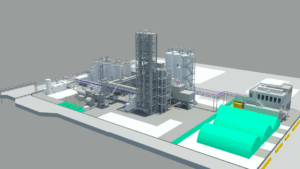Sulzer Ltd. (Winterthur, Switzerland) has announced that its advanced separation technology will enable end-of-life plastics recycling at Indaver’s first plastic depolymerization plant currently under construction in Antwerp, Belgium. The new Plastics2Chemicals (P2C) plant will drive polymer circularity by using Sulzer separation technology to reclaim and purify 30,000 tons of plastic waste per year. The resulting pure chemical feedstock can then be reused in manufacturing.

Sulzer technology at the heart of Indaver’s Plastics2Chemicals plant recycling 30,000 tons of plastic waste each year (Source: Sulzer)
As a leading European sustainable waste management company based in Belgium, Indaver is leveraging Sulzer’s advanced separation technology to develop safe recycling methods for typically non-recyclable post-consumer plastic. This demo-plant is the first of a number of sustainable P2C facilities that Indaver plans to build in strategic locations across Europe, together which will upcycle one million tonnes of used plastic.
After breaking long plastic macromolecules (polymers) down to simple monomers through depolymerization, the new P2C facility will use Sulzer Chemtech equipment to recover and purify the monomers to be used in the production of packaging materials and electronic devices, such as butter dishes, chocolate foils, cups, and yoghurt pots amongst others.
Indaver elected to partner with Sulzer in this project due to its extensive research and pilot testing at Sulzer Chemtech’s in-house pilot plant in Allschwil, Switzerland. Sulzer is delivering four units that will run proprietary processes to enhance the quality of the recovered styrene or oil fractions. The Sulzer Chemtech equipment is critical to purification of chemical feedstock, enabling the polymer circularity.
Suzanne Thoma, Executive President, comments: “We are enthusiastic about Sulzer’s technology and solutions for chemical processing solutions. With about 80% of the global market utilizing our solutions for the conventional production and purification of styrene, ours has become a de facto standard that the industry relies on. We are pleased to apply our extensive knowledge and expertise to innovative, circular applications that leverage waste as feedstock, such as Indaver’s Plastics2Chemicals plant.”
Paul De Bruycker, CEO Indaver, concludes: “One of the most challenging aspects of our P2C installation is preventing the polymerization of styrene while it is being processed. To address this issue, we chose to partner with Sulzer Chemtech, which is a leading expert in this field and offers extensive pilot testing capabilities to ensure the process is fully optimized. We are extremely happy with this collaboration and look forward to the completion of the plant in Antwerp that will allow us to start driving upcycling practices forward, giving a second life to post-consumer plastic.